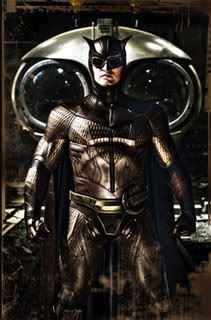 Over at the Chicago Sun-Times’ Scanners blog, Jim Emerson asks the key question of the “Watchmen” movie: Is it a good idea to re-read the graphic novel before seeing Zack Snyder’s adaptation?
Over at the Chicago Sun-Times’ Scanners blog, Jim Emerson asks the key question of the “Watchmen” movie: Is it a good idea to re-read the graphic novel before seeing Zack Snyder’s adaptation?
My standard operating procedure over many years as a movie critic has been to keep the movie experience as separate from the source material as possible — at least on first viewing. Otherwise it can be hard to tell what the movie is doing and what you’re bringing to it from earlier impressions.
If I’ve already encountered a pre-existing version of the “property,” then so be it. I can’t go back and un-experience it. Either way, I can’t judge the adaptation But I usually like to see the movie fresh, and do any research I feel compelled to do afterwards. Then, perhaps, I’ll re-visit the movie, Knowing What I Know Now.
That’s essentially the same way I approach adaptations. If I hear a specific book is being made into a movie, I won’t read that book, no matter how much I may want to. There are no restrictions on catching up to a given book after I see the movie, of course — sometimes it’s essential to writing the review — but for the most part, I want to see how the movie works, or doesn’t work, as a movie.
Now, in this case, Emerson is already familiar with “Watchmen” — though he says he read it so long ago that he “(doesn’t) even remember there was a blue naked guy in it” — so this would be a re-encountering of the text, rather than a new reading. But it’s a good question to pose to those of us who know the book backwards and forwards.
I haven’t read it in several years, myself, but I know it pretty damn well — and I’m still debating whether that was a plus or a minus for the experience of seeing the movie. (For instance: Is it a valid complaint to point out that the movie changes one word in my favorite line of dialogue, when the purpose of the line remains intact?)
Read Emerson’s piece, and think on it. Then tell me what you’d do …
I am firmly of the belief that familiarity with the source material irreparably skews perception of the movie adaptation. So, if I know a movie to be an adaptation, I stay away from the source material.
Some situations are tricky though. For instance, if a book is on my ‘must read’ list, and then I become aware of an upcoming adaptation, I usually still read the book as I planned. For instance, having read almost all Neil Gaiman’s stuff, I went ahead and read Coraline about a year ago even though I knew movie is coming.
Just last night I finished reading ‘Scott Pilgrim vs. the Universe’ even though Edgar Wright’s movie is coming. But I’ve already read the other books, so this is more a case of being halfway through the material when I hear about the adaptation. I wouldn’t stop halfway.
And if an adaptation is upcoming of something I read some time ago, I often give in to the temptation to reread the material. I reread Lord of the Rings six months before Fellowship came out, after not having read them in some time. (I still greatly enjoyed the movies).
And I DID reread Watchman recently, after about 10 years.
Yeah, that will doubtless negatively skew my perception of the movie, but I’ve read it so many times since it came out in ’86 so my perception would have been skewed regardless. But deep down, I know I would have been better off not doing so.
I’m not going to re-read it. However, I’ve read it at least 50 times in my life, no joke, so my perception is going to be skewed either way and I’ll just have to disclose that in my review.
Do you mean the Doc Manhattan line that is used in the posters?
@ Steve — I’m in the same boat with the “Scott Pilgrim” books. I proceed under the assumption that Wright’s adaptation can’t possibly have room for all five books published to date, and since I’d read the first four before the film was announced, well, no point in stopping now.
@ Mark — yeah, I’m probably going to handle it the same way. Also, I now feel professionally justified in buying “Absolute Watchmen” earlier this afternoon.
@ Kate — No, it’s a different line. One of the most important in the whole epic, I’d say. I’m pretty sure you’ll know it when you hear it.